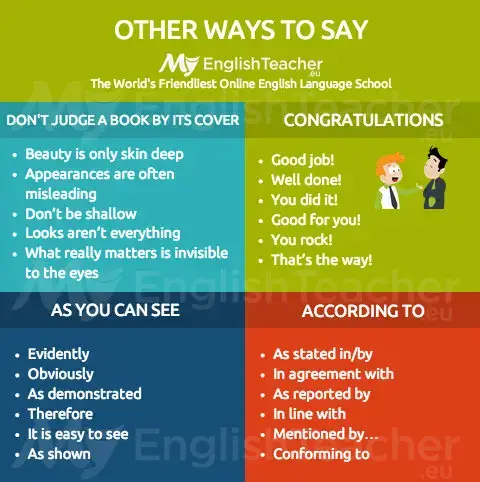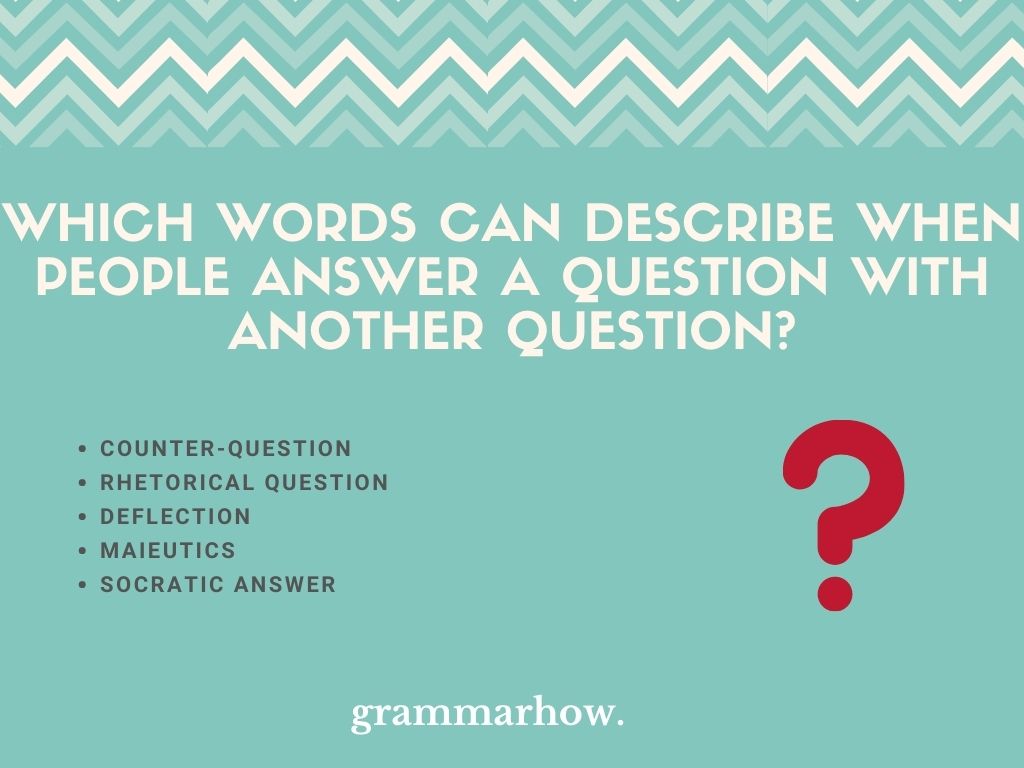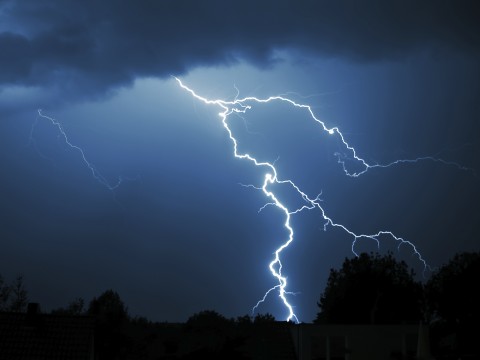Answering a question with a question is an annoying thing that some English speakers do. If you come across it, it might help you learn some synonyms that mean exactly that, without the long-winded description. This article will explain the best synonyms for that case.
Which Words Can Describe When People Answer A Question With Another Question?
There are a few words we want to talk about in this article, each one offering a different way to answer a question with another question.
- Counter-question
- Rhetorical question
- Deflection
- Maieutics
- Socratic answer
The preferred version is “counter-question” because it is the closest related word that answers a question with another question. We use them to try to find a different answer than the one we were previously asked about. “Rhetorical question” and “deflection” are also good choices.
Counter Question
We will start by looking into what a “counter-question” is and how we use it. If you’re familiar with the prefix word “counter,” you might already have a good idea.
A “counter-question” is something that “counters” (turns back on someone else) the previously asked question. We usually ask them by approaching the same topic as the original question but in a different manner or expecting a different answer.
It’s common for many speakers to come up with counter-questions when they’re not happy answering the previous one. Whether they don’t know the answer, or they think it’s too personal, a counter-question is a good way of turning the spotlight around on the original asker.
Many native speakers also understand the meaning of “counter-question.” Even if they haven’t heard the word before, it’s easy to work out from context since the word “counter” is so familiar to many native English speakers.
It might help you to see some examples of using “counter-question” in a sentence, as well as how they might work in practice.
- Have you got the answer to this question?
- Counter-question. Do you think you know the answer yourself?
- Sir, why don’t I have higher wages for what I do?
- As a counter-question, why do you think you deserve higher wages?
- Can we discuss what we are with each other?
- Counter-question, what do you want for dinner tonight? I’m hungry.
Rhetorical Question
The next best option is “rhetorical question.” It’s common for many English speakers to refer to a question answering a question as a rhetorical question, so you can expect many of them to understand it.
A “rhetorical question” is a question that doesn’t need an answer. It’s possible to answer a question with a rhetorical question when you don’t expect an answer in response to your own question.
Because you don’t expect a response, it’s likely that the rhetorical question you ask is rude or shocking, and the other person isn’t comfortable answering it when it’s asked.
You’ll hear the phrase “rhetorical question” a lot, which makes it one of the more viable candidates in the list of synonyms for questions that answer questions.
Here are some cases you might see where rhetorical questions work well:
- Do you know what you’re talking about?
- Do you think I know?
- That’s an annoying rhetorical question to ask.
- Have you any ideas?
- Have you known me to have many ideas before?
- Stop with the rhetorical questions.
- Are you available tonight?
- Do I have to do things tonight?
- That’s why I asked. Don’t give me a rhetorical question like that.
Deflection
A deflection is something that we can throw at somebody when we want to avoid answering the question. It doesn’t always need to be a question, but it’s possible to write it as one in this case.
“Deflections” means we ask another question to avoid answering the previous one. Usually, we “deflect” a question with a question when we’re not comfortable with the personal level that the question is trying to invade upon.
Again, “deflections” aren’t always questions, which is what makes them so well-rounded to be on this list. However, in this instance, we might answer a question with a question if we want to show the original asker how personal their question was.
It’s usually very obvious when you “deflect” a question. Typically, the original asker will know that you’re trying to stop yourself from answering because you’re uncomfortable. From there, they might press harder, or they might back off, depending on what the question was.
Deflection might look like this:
- Do you have time to talk today?
- Do I look like I have time?
- There was no need for that deflection.
- Are you doing okay?
- Have you seen my new toy?
- Don’t deflect. Answer me honestly.
- Do you need any help from me?
- You should visit the lakes. Do you like lakes?
- Don’t come at me with that deflection! I’m here to help you.
Maieutics
The next word is something that not many native speakers know about. It’s got deep ties to philosophy and historical practices, which is why we don’t include it higher in this list.
“Maieutics” is the name given to the Socratic method (philosophical method) of answering questions with thought-provoking questions, expecting answers to come from within.
If you believe in the philosophical style of asking questions to find answers, you might believe in maieutics and how they work. Socrates was the first to come up with this idea, which is why they’re a Socratic method of sorts.
Usually, maieutics is profound and asks a new question to the original asker to find out how they view the world or something within it. It causes them to forget about their original question and ponder the what-ifs of their own life instead.
These are some examples of good ways to use maieutics:
- Have you given yourself to God?
- What is God to you?
- That’s maieutic if I ever heard one. Let me think.
- Where do you see yourself in five years?
- Aren’t we all heading down the same path inevitably?
- I see you’ve been studying maieutics.
- Can I help you?
- Are you able to tell me why we’re here? Why do any of us even exist?
- Okay, I don’t have time for your maieutics today.
Socratic Answer
Finally, we might hear “Socratic answer” as an option to answer a question with a question. It’s simply an extension on maieutics, and it uses more familiar terminology to explain them.
“Socratic answers” are questions that ponder the more intense things in life. They’re profound and full of emotion, designed to get the asker to think hard about their answer.
“Socratic answers” and “maieutics” are synonymous. We can use either of them interchangeably to the same degree, so it’s up to you which one you think is easier.
Here are a few more examples of using them:
- Is this everything?
- Isn’t everything already within you?
- What?
- Can I see that?
- That depends. Are your eyes wise enough to comprehend?
- I hate Socratic answers.
We’ve covered the best words for answering a question with another question, and we’ve provided some examples too. However, we thought it might help to dedicate a section specifically to a group of examples that you can pick and choose from.
A counter-question might simply be used to look for more information:
- Can I help you?
- Do you sell anything here?
- Are you free?
- When do you need me?
A rhetorical question or deflection might be used to try and avoid answering a question:
- Where are you going?
- Wouldn’t you like to know?
- Is this all you have?
- Do you like muffins?
Socratic answers and maieutics are the best ways to confuse the original asker and have them ponder a deeper thought, which gets them to forget about their original question:
- Where are we?
- Isn’t that question invalid when you think about it on the scale of the universe?
- Why would you do that?
- Why would anyone do anything worth anything?
Is It Appropriate To Answer A Question With A Question?
Generally, people don’t like their questions to be answered with another question. In most cases, you’ll find that people think it’s rude, especially if it’s obvious that you’re trying to deflect from opening yourself up to answer the original question.
Answering a question with a question is usually rude. If you don’t want to answer the question, you don’t have to say anything. People believe it’s quite pretentious if you answer a question with a question.
The only case where it might be acceptable is when you walk into a shop, and the following is asked:
- Can I help you?
From there, we can usually ask a question to gather more information, and this is socially acceptable:
- Do you have any new products?
Most people are used to this kind of exchange, which is why it works well.
Why Do People Answer A Question With A Question?
Most people answer a question with a question when they’re not comfortable responding to the original question. If they don’t have an answer already or if they don’t know what to say, then they might deflect the question and get the asker to answer something instead.
You may also like: 11 Words For Someone Who Avoids Answering Questions
Martin holds a Master’s degree in Finance and International Business. He has six years of experience in professional communication with clients, executives, and colleagues. Furthermore, he has teaching experience from Aarhus University. Martin has been featured as an expert in communication and teaching on Forbes and Shopify. Read more about Martin here.
Is it not true that counter-question is a good match that describes the exact structure that you inquire about? Can you have a counter-question without an initial question?
Also, wouldn’t you agree, though it might be obvious, that the second question (the answering question) is called a rhetorical question?
Out of numerous figures that are are related to this type of address, if I use for example interrogatio and question my own answer, preferably with more style than I employ, am I not actually confirming and reinforcing the answer that I have given?
Other figures are: erotema, anacoenosis, anthypophora, dianoea, aporia, epiplexis, exuscitatio, pysma and ratiocinatio and some of them cover exactly the meaning that you mention in comments: challenging the initial question.
In case that the second question is not a rhetorical question, but a real question that is raised by the first question then I would say you are simply investigating the subject in search for stasis (and the term counter-question still covers it).
___________________________________
The question words
Упражнение 1. Match the question
words to the answers.
|
1. 2. 3. 4. 5. 6. What? 7. Whose? 8. How |
a) b) c) d) e) f) g) h) |
Упражнение 2. Вставьте вопросительные слова:
what, where or when.
- _____
does Molly get up? – At 10 o’clock. - _____
does Molly have lunch? – At school. - _____
does Molly read in the morning? – A book. - _____
do Molly’s parents get home? – At 6 o’clock. - _____
does Molly’s family have dinner? – At home. - _____
does Molly do after dinner? – She brushes her teeth.
Упражнение 3. Ask questions with
who, what, how, where, when or why
- _______ is
your name? - _______
do you spell your name? - _______ are
you from? - _______ do
you live? - _______ old
are you? - _______ is
your birthday? - _______ tall
are you? - _______
kind of films do you like? - _______ is
your favorite singer? - _______
is your favorite TV programme?
Упражнение 4. Look at these
answers Find one answer for each question word.
|
1. 2. 3. 4. 5. 6. When? 7. Why? |
a) b) c) d) e) f) g) |
______________________________________
The question words
Упражнение 1. Match the question
words to the answers.
|
1. 2. 3. 4. 5. 6. What? 7. Whose? 8. How |
a) b) c) d) e) f) g) h) |
Упражнение 2. Вставьте вопросительные слова:
what, where or when.
- _____
does Molly get up? – At 10 o’clock. - _____
does Molly have lunch? – At school. - _____
does Molly read in the morning? – A book. - _____
do Molly’s parents get home? – At 6 o’clock. - _____
does Molly’s family have dinner? – At home. - _____
does Molly do after dinner? – She brushes her teeth.
Упражнение 3. Ask questions with
who, what, how, where, when or why
- _______ is
your name? - _______
do you spell your name? - _______ are
you from? - _______ do
you live? - _______ old
are you? - _______ is
your birthday? - _______ tall
are you? - _______
kind of films do you like? - _______ is
your favorite singer? - _______
is your favorite TV programme?
Упражнение 4. Look at these
answers Find one answer for each question word.
|
1. 2. 3. 4. 5. 6. When? 7. Why? |
a) b) c) d) e) f) g) |
___________________________________
The question words
Упражнение 1. Match the question
words to the answers.
|
1. 2. 3. 4. 5. 6. What? 7. Whose? 8. How |
a) b) c) d) e) f) g) h) |
Упражнение 2. Вставьте вопросительные слова:
what, where or when.
- _____
does Molly get up? – At 10 o’clock. - _____
does Molly have lunch? – At school. - _____
does Molly read in the morning? – A book. - _____
do Molly’s parents get home? – At 6 o’clock. - _____
does Molly’s family have dinner? – At home. - _____
does Molly do after dinner? – She brushes her teeth.
Упражнение 3. Ask questions with
who, what, how, where, when or why
- _______ is
your name? - _______
do you spell your name? - _______ are
you from? - _______ do
you live? - _______ old
are you? - _______ is
your birthday? - _______ tall
are you? - _______
kind of films do you like? - _______ is
your favorite singer? - _______
is your favorite TV programme?
Упражнение 4. Look at these
answers Find one answer for each question word.
|
1. 2. 3. 4. 5. 6. When? 7. Why? |
a) b) c) d) e) f) g) |
______________________________________
The question words
Упражнение 1. Match the question
words to the answers.
|
1. 2. 3. 4. 5. 6. What? 7. Whose? 8. How |
a) b) c) d) e) f) g) h) |
Упражнение 2. Вставьте вопросительные слова:
what, where or when.
- _____
does Molly get up? – At 10 o’clock. - _____
does Molly have lunch? – At school. - _____
does Molly read in the morning? – A book. - _____
do Molly’s parents get home? – At 6 o’clock. - _____
does Molly’s family have dinner? – At home. - _____
does Molly do after dinner? – She brushes her teeth.
Упражнение 3. Ask questions with
who, what, how, where, when or why
- _______ is
your name? - _______
do you spell your name? - _______ are
you from? - _______ do
you live? - _______ old
are you? - _______ is
your birthday? - _______ tall
are you? - _______
kind of films do you like? - _______ is
your favorite singer? - _______
is your favorite TV programme?
Упражнение 4. Look at these
answers Find one answer for each question word.
|
1. 2. 3. 4. 5. 6. When? 7. Why? |
a) b) c) d) e) f) g) |
Скачано с
www.znanio.ru

Synonyms for According To:
You can say:
- as stated in/by
- in agreement with
- as reported by
- just as
- XY stated
- XY related
- in keeping with
- in accordance with
- in line with
- in XY’s opinion
- claimed by…
- mentioned by…
- in consonance with
- conforming to
- as part of…
- referring to
- in the opinion of
- in accordance with
- pursuant to
- as believed by
- as maintained by
- in the light of
- as far as I know
- from the best of my knowledge
- as you can see
More for you:
Questions and Answers to Prepare You for a Job Interview
Order of Adjectives: Explanation + Exercises
Other ways to say FOR EXAMPLE!
Other ways to say “in other words”

The mind that opens to a new idea never returns to its original size.
– Albert Einstein
Humans love puzzles. The unknown drives us to solve the puzzle and get an adrenaline rush when we find the answer. It is challenging for the brain, and we chase a sense of closure when the mystery is solved.
Think about it; Why do people love Sherlock Holmes?
He always solves the mystery!
Unfortunately, there are many questions out there that man may never learn the answers to. The world is a vast, mysterious place, and there are many things that even scientists don’t understand. Let’s explore some of the questions that there are no answers to.
Here is my list of 100 unanswerable questions:
Tough Unanswerable Questions
- At what time did time begin?
- Which came first: the sun or the earth?
- Is the opposite of opposite the same or opposite?
- Why is there a fridge light but no freezer light?
- Does a staircase go up or down?
- How far east can you travel before you are travelling west?
- Is there another word for “thesaurus”?
- Why is a “manhole” round?
- Why do we call them buildings if buildings are already built?
- If you decide to be indecisive, which are you?
- Did humans invent maths or discover maths?
- When you forget a thought, where does it go?
- If God invented humans, who created God?
- What came first: the seed or the plant?
- How do you know that you are not hallucinating?
- Why do we make exceptions to rules if we all should follow the rules?
- How can you describe something indescribable?
- Are we living, or are we dying?
- Who is the world in debt to if humans invented money?
- Can someone blind from birth see in their dreams?
Next: 80 Funny Questions to Ask – Sorry, Not Sorry!
Funny Unanswerable Questions
- Can you have a daydream at night-time?
- Are child actors in adult-rated movies allowed to watch the film?
- If you are bald, can you get dandruff?
- Can you yawn when you are asleep?
- If the sky is the limit, then what is space?
- Does a dentist go to other dentists for their teeth?
- Why does Tarzan never have a beard?
- Where do the missing socks go?
- If a cave has a cave-in, is it still called a cave?
- Do cannibals think clowns taste funny?
Animal Questions
- How do we know that a new dogfood has an “improved taste”?
- If heaps of cats are lying on top of each other, is it still called a dog pile?
- Is it okay for an endangered animal to eat an endangered plant?
- Why does the Easter Bunny bring eggs when rabbits don’t lay eggs?
- Can a fish get seasick?
- Why did the chicken cross the road?
- Are animals that don’t live in houses homeless?
- How can a jellyfish stand up for itself when it has no backbone?
- Do you call “a fly” a fly if it can’t fly?
- Why do we say spineless snake when a snake has a spine?
Next: 110 Hypothetical Questions
Food Questions
- Why is a pizza box square when a pizza is round?
- Why do we cook bacon and bake cookies?
- Why is vanilla ice cream white but vanilla extract brown?
- Why are bread square and sandwich meat round?
- Can you drink something without eating it?
- If a grape is sweet, why did we call the grapefruit by its name?
- A tomato is a fruit, so why is ketchup not called a smoothie?
- If you have dinner for breakfast, is it still dinner?
- If you can be allergic to anything, can you have an allergy to water?
- How can anyone taste the rainbow?
Questions of the World
- How do you learn about something that doesn’t exist?
- If the truth is different for each of us, how can we call it the truth?
- Why are cars made that go faster than the worlds speed limits?
- Does a mirror have a colour, or does it reflect a colour?
- If you have fun wasting time, is it time wasted?
- How do we know we all see the same colours in the same way?
- If, in an instant, a moving object looks the same as an unmoving object, is movement possible?
- If a tree falls and no one hears it, does it make a sound?
- Will tomorrow ever come?
- Who decided what makes us human?
- If anything is possible, can anything be impossible?
- Is it possible to know everything?
- Why is it a raindrop but a snowfall?
- Is it possible to know if something is good or bad?
- Which came first: the universe or time?
- Will you exist in the future if you can’t ever go there?
- What is the purpose of death?
- If you restore a ship piece by piece, is it the same ship?
- Why is the word dictionary in the dictionary?
- How do you expect the unexpected?
- If you try to fail to succeed, then which have you done?
- Why is abbreviated a long word?
- Why is a stage ring square in shape?
- Did Adam and Eve have a bellybutton?
- Why does your nose run and your feet smell?
- How can you throw away a garbage can?
- If you hate a hater, do you hate yourself?
- Why does bottled water expire?
- Why do we count sheep before bed?
- On a flight, which armrest is yours?
- If something is new, how can it be both new and improved?
- Why does the early bird get the worm, but patience is a virtue?
- What existed before the universe?
- Could you drown in the fountain of youth?
- Would time continue if everything in the world was frozen?
- Is the world eternal?
- When does the future begin?
- Is your glass half-empty or half-full?
- Do you have to swallow gum to get the calories?
- How do you know that you exist?
- Can you cry underwater?
- If you are halfway from your destination, is it from the beginning or the end?
- Is the earth alive?
- Why are we called humans?
- Why does “slim chance” and “fat chance” have the same meaning?
- Can we ever reach the future?
- How does the universe expand if there is nothing outside of it?
- What is a dream?
- Can God create a stone that is too heavy for even him to lift?
- Is a question with no answer still called a question?
I hope you enjoyed this list of unanswerable questions. Did you find any of the answers?
Let me tell you a secret! Wisdom doesn’t come from finding the correct answer – but from asking the right question!
More Questions You’ll Love :
110 Hypothetical Questions // 101 Philosophical Questions // 101 Thought Provoking Questions // 120 What If Questions
To Ask People:
154 Weird Questions To Ask // 118 Random Questions To Ask // 100 Dumb Questions to Ask
100 Stupid Questions to Ask // 200 Deep Questions to Ask // Funny Questions to Ask
- Author
- Recent Posts
Questions
Exercises
1. Write questions
and answers for the following statements, as in the example:
1) Paul was tired
when he got home. Was Paul tired when he got home?
2) They live in
London. ………………………………
3) She can’t play
the piano. ……………………………………
4) The film starts
at nine o’clock. ……………………………………………
5) You had an
English lesson last night. …………………………………………………
6) She has got
blue eyes. ……………………………………………….
7) We didn’t want
to go to the beach
…………………………………………………

follow the doctor’s advice.
………………………………………………………
2. Write the short
form of the following negative questions:
1) Can they not
decide where to go on holiday? Can’t they decide where to go on holiday?
2) Do you not enjoy
watching horror films?
…………………………………………………………..
3) Have you not
finished your homework yet?
……………………………………………………………..
4) Can she not go
to town on her own? ……………………………………………….
5) Does he not
know where we live?
………………………………………………….
6) Did he not give
you any detailes? …………………………………………………
3. Fill in the
gaps with the correct question word(s).
A: Now for the
general knowledge part of the quiz. 1) …What… is the capital
of Egypt?
B: Cairo.
A: That’s correct.
2) ……. can you see the Mona Lisa?
B: In the Louvre,
in Paris.
A: Well done,
that’s right. 3) …….. wrote ‘Romeo and Juliet’?
B: Charles
Dickens.
A: No, that’s
incorrect. It was Shakespeare. 4). …… are the Olympic Games held?
B: Every four
years.
A: Correct. 5) …….
did the Second World War begin?
B: I think it was
in 1939.
A: Yes, you’re
right. And the final question in this round is: 6)……. players are there in a
hockey team?
B: Eleven.
A: Correct. Well,
at the end of that round, Contestant 2 has the most points, so he goes through
to the final round to play for our star prize.
4. Fill in who,
whose, what, which, where, when, how long, how often, what time, why, how much
or how many.
1. ‘…Which… is
your jacket?’ ‘It’s the red one.’
2. ‘…… is your
birthday?’ ‘It’s next week.’
3. ‘…… is Mary?’
‘She’s in her bedroom.’
4. ‘…… have you
been waiting?’ ‘Only five minutes.’
5. ‘…… party are
you going to tonight?’ ‘Alison’s.’
6. ‘…… do you go
shopping?’ ‘Once a week.’
7. ‘…… are you
doing at the moment?’ ‘I’m watching TV.1’
8. ‘…… are you
writing to?’ ‘Uncle Tom.’
9. ‘…… do you
start work?’ ‘At nine o’clock in the morning.’
10. ‘…… pieces of
toast do you want?’ ‘Two, please.’
11. ‘…… isn’t she
at work today?’ ‘Because she’s ill.’
12. ‘…… did you
spend last month?’ ‘About $500’.
4. Fill in the
gaps with what, which or how.
1. A: …What…
do you want to do when you leave school?
B: I’m not really
sure. I’d like to be a vet.
2. A: ……. bag do
you prefer — the black one or the brown one?
В: I like the
black one best,
3. A: ………… old are
you?
B: It was my
birthday last week. Now I’m fifteen.
4. A: …………. did
you get my telephone number?
В: I looked in the
staff address book.
5. A: ………… shall
we do on Saturday?
B: Let’s just stay
at home and watch a video.
6. A: …………. house
did you prefer — the one we saw first or second?
В: I didn’t like
either. We’ll have to keep looking.
7. A: ……….. many
pairs of shoes did you buy last year?
B: Only two. One
in the summer and one in the winter.
8. A: ………….. is
your favourite food?
B: Roast chicken.
5. Write questions
to which the words in bold are the answers.
1. The tiger
is the largest member of the cat family. Which is the largest
member of the cat family?
2. A mature male
tiger weighs between 160 and 230 kg.
3. Tigers are
usually orange with black stripes.
4. Tigers live in
Russia, China, India and South-East Asia.
5. The Javan
tiger, the Bali tiger and the Caspian tiger are extinct.
6. Tigers eat a
variety of smaller animals, including deer.
7. Tigers can
produce young at any time of year.
8. Tigers usually
have two or three cubs at a time.
9. Tigers live for
an average of eleven years.
10. Tigers are
hunted for sport or for their fur.
6. Write
questions to which the words in bold are the answers.
Claudette is 32
years old. She lives in Paris, France. She has lived there since
she was 5 years old. Claudette works as a lawyer for a successful
law firm, and travels to work by car every day. Claudette is married.
Her husband’s name is Jean. They have two dogs. She loves to
take the dogs for long walks every evening after work. Claudette has
several hobbies, such as reading and playing the piano, but her favourite
hobby is cooking. Jean thinks this is good, too, because he gets to eat
the wonderful meals she makes.
1.How old is she?
7. Write questions
to which the words in bold are the answers.
1. The
Petersons have bought a dog. …. Who has bought a dog?…
2. The Petersons
have bought a dog. …What have the Petersons bought?…
3. Rachel
is writing a letter.
Asking questions is one of the most effective ways for getting to know someone on a personal level. People tend to be curious about things, and as social creatures, this often applies to the people around us. Knowing the top ten English questions and how to answer them will help you get to know the people around you, and help them know you better in exchange!
In this article, I’ll introduce you to the most essential English questions and answers for beginners and intermediate learners. For each question, there will be:
- A breakdown of the most popular form of the question.
- A list of alternative ways to ask the question (if any).
- A table of possible answers to common English questions, with examples and additional notes if needed.
Let’s dive in!
- → If you’re not quite comfortable with your current introduction skills, EnglishClass101.com has an article all about introducing yourself that you can start with.
Table of Contents
- Question Words in English
- What’s your name?
- Where are you from?
- What do you do?
- Do you have any brothers or sisters?
- How long have you been studying English?
- How are you?
- What time is it?
- What are you doing?
- What’s wrong?
- What’s the weather like?
- Final Thoughts
1. Question Words in English
Before I discuss questions and answers in English conversations, I’ll briefly cover an important topic: question words in English.
In English, there are six main words that we tend to use when asking questions. These are:
- What: Used when asking for information about something.
- Where: Used when asking about location.
- When: Used when asking about time.
- Who: Used when asking about a person or people.
- Why: Used when asking about motive or intention.
- How: Used when asking about the means by which something happened.
We almost always put these words at the very beginning of a question.
You’ll notice that all of these words begin with a “W” except for the last one. When children are learning English, these question words are often referred to as “Five W’s and an H” to help them remember. There are additional question words, but these six are used most often, especially in journalism.
As you read this article, you’ll also see that “what” is the most commonly used question word. This is because it’s extremely versatile, and can be used to ask a variety of question types.
2. What’s your name?
When you first meet someone, usually the first question they ask is “What is your name?” Before we learn how to answer, let’s break down the question:
| Question Word | “To Be” Verb | Second-Person Possessive Pronoun | What You’re Called |
| What | is | your | name? |
As you can see, the question begins with a “question word.” This is the word a person uses to show that they want some kind of information, and they usually go at the beginning of a question.
The question word is followed by a “to be” verb, in this case, the word “is.” This indicates that the person is inquiring about the status or definition of something.
Next is the word “your,” which is the possessive form of the second-person pronoun “you.” They’re asking about the name that belongs to you, and no one else.
Finally is the word “name,” which is the piece of information the person is after. When you put the question together, they’re basically asking what you are called, or what name belongs to you.
Alternative Questions
Here are two other ways of asking the same question:
- “What’s your name?”
- “What can I call you?”
Possible Patterns & Answers
There are four basic sentence patterns you can use to answer this question. In each one, simply fill in the blank with your name.
| Pattern | Answer | Additional Note |
| My name is ___. | My name is Tom. My name is Alisha. |
More formal |
| You can call me ___. | You can call me Tom. You can call me Alisha. |
More formal |
| I’m ___. | I’m Tom. I’m Alisha. |
Less formal |
| ___. | Tom. Alisha. |
Less formal |
3. Where are you from?
Learning where someone is from can be very exciting, and many people in the United States love to learn about other places. The next question you’re likely to hear is “Where are you from?”
| Question Word | “To Be” Verb | Second-Person Pronoun | Preposition Referring to Origin |
| Where | are | you | from? |
This question structure is very similar to the one above. It begins with a question word for location, followed by a “to be” verb and second-person pronoun. The last word, “from,” indicates that the speaker wants to know your original location, or where you lived before.
Possible Patterns & Answers
The simplest way to answer this question is with the pattern “I’m from ___.” You just need to put the name of your home country in the blank. If you want, you can also include the name of the state, city, or town you’re from, like in the last example.
| Pattern | Answer |
| I’m from ___. | I’m from Norway. I’m from the U.S.A. I’m from Germany. I’m from Lublin, Poland. |
- → Not sure what your country is called in English? Check out EnglishClass101’s Vocabulary for Nationalities page!
4. What do you do?
In the United States, people love talking about their jobs and hearing what other people do for a living. While you’re getting to know someone, you’re going to hear the question “What do you do?”
| Question Word | Perform Action Of | Second-Person Pronoun | Perform Action Of |
| What | do | you | do? |
This question begins with the question word “what,” followed by the word “do,” which means to perform an action. Next is the second-person pronoun “you,” also followed by the word “do.”
Alternative Questions
Here are two more ways of asking the same question:
- “What do you do for a living?”
- “Where do you work?”
Possible Patterns & Answers
| Pattern | Answer | Additional Notes |
| I am a(n) ___. | I am a teacher. I am a programmer. I am a writer. I am an accountant. |
Fill in the blank with your job. |
| I work as a(n) ___. | I work as a teacher. I work as a programmer. I work as a writer. I work as an accountant. |
Fill in the blank with your job. |
| I work at ___. | I work at the elementary school. I work at Google. I work at home. I work at a large company. |
Fill in the blank with your place of work. |
- → Check out EnglishClass101’s vocabulary list on Jobs & Work to figure out what your job is called. Alternatively, if you’re looking for work in the United States, we’ve also curated an article on how to find and attain the best U.S. job for you!
5. Do you have any brothers or sisters?
Once a new acquaintance starts getting to know you better, they’ll probably want to know if you have any siblings. A common way to ask this question is: “Do you have any brothers or sisters?”
| Perform Action Of | Second-Person Pronoun | To Own | Indefinite Pronoun | Male Siblings | Word Referring To Another Possibility | Female Siblings |
| Do | you | have | any | brothers | or | sisters? |
This question has a few more words than the other ones we’ve looked at, and doesn’t begin with a “real” question word. The word “do,” when used at the beginning of a question, is sometimes called a “dummy” question word—it’s a word that can indicate a question despite not technically serving that purpose in English grammar.
When you put the above question together, it shows that the other person is asking if you have siblings. The indefinite pronoun “any” leaves the question slightly open-ended, so you can answer more specifically about how many siblings you have, what gender they are, and even whether they’re older or younger than you.
There are three basic patterns you can use to answer.
Alternative Questions
Here are two other questions in English that basically ask the same thing:
- “Do you have any siblings?”
- “Are you an only child?”
Possible Patterns & Answers
| Pattern | Answer | Additional Notes |
| I have (a) ___. | I have a sister. I have a brother. I have a younger sister. I have an older brother. I have three sisters. I have one older sister. |
You can also indicate whether your sibling (or siblings) is older or younger than you by using the appropriate adjective. |
| I have ___ and ___. | I have two brothers and one sister. I have three sisters and one brother. |
Use if you have siblings of different genders. |
| No, I don’t. I’m an only child. | – | Use if you don’t have any siblings. |
- → Do you need to learn some additional vocabulary to talk about your siblings and family? EnglishClass101 has a word list for you, and a blog post all about family in the United States!
6. How long have you been studying English?
Your conversation partner is very impressed so far with your English speaking and communication skills. They ask “How long have you been studying English?”
| Question Word | An Amount Of Time | Second-Person Pronoun | Gerund Form Of The Word “Study” | The English Language | ||
| How | long | have | you | been | studying | English? |
This is another long question, but it does a better job of following the usual question format. Before we move on to possible answers, please note the words “have” and “been.” Even though there’s a word separating them, it’s important to see how these two words work together.
When someone says the phrase “have been,” it indicates that something has been going on for a certain amount of time. So, in this question, they want to know the amount of time that you have been studying the English language.
Possible Patterns & Answers
| Pattern | Answer | Additional Notes |
| I’ve been studying for ___. | I’ve been studying for one month. I’ve been studying for two years. |
Most formal. |
| For ___. | For five years. For three weeks. |
Less formal. |
| ___. | Nine months. A few years. |
Least formal. |
- → To learn more about how to say dates in English, check out EnglishClass101’s article on this very topic.
7. How are you?
Congratulations! You’ve officially made a new friend, and you’re getting coffee together a week later. The moment you see each other again, they ask “How are you?”
| Question Word | “To Be” Verb | Second-Person Pronoun |
| How | are | you? |
This is one of the most basic English questions that family, friends, and even colleagues ask each other all the time. As you can see above, it’s simply a question word followed by the “to be” verb “are,” and then the second-person pronoun “you.” Basically, they’re asking about your status—how you’re feeling or how your week has been.
Alternative Questions
You may also hear the question asked this way:
- “How are you doing?”
- “How have you been?”
Possible Patterns & Answers
| Pattern | Answer | Additional Notes |
| I’m doing ___. | I’m doing fine. I’m doing pretty good. |
While the word “doing” is used in this answer, it doesn’t refer to a specific action. It instead refers to how you’re feeling or how life is going for you. |
| I’m ___. | I’m okay. I’m great. |
This is basically the same as the above pattern, but shorter. |
| I’ve been ___. | I’ve been well. I’ve been alright. |
Using this pattern indicates that you’re answering about how you’ve been feeling over a longer period of time. For example, if you haven’t seen someone in a few months, and they ask you this, you’ll tell them how you’ve been over the last few months. |
- → Learn how to express what you’re feeling with our relevant vocabulary lists: Top 20 Words for Positive Emotions and Top 21 Words for Negative Emotions.
8. What time is it?
Another very frequent question you’re likely to hear is “What time is it?”
| Question Word | The Current Time (Hours/Minutes) | “To Be” Verb | Pronoun Referring to the Word “Time” |
| What | time | is | it? |
In this question, you can see that the question word “what” is placed at the beginning of the sentence, followed by the information being requested (“time”). Next is the “to be” verb “is” and the pronoun “it,” which in this case refers to the earlier-used word “time.” The person is simply asking you for the current time, usually in hours and minutes.
Alternative Questions
You may also hear the question asked this way:
- “Do you have the time?”
Possible Patterns & Answers
| Pattern | Answer | Additional Notes |
| It’s ___ o’clock. | It’s twelve o’clock. It’s three o’clock. |
Most formal. |
| It’s ___. | It’s two-thirty. It’s nine-fifteen. |
Less formal. |
| ___. | Ten. Four forty-five. |
Least formal. |
- → For more information on how to tell time in English, be sure to read EnglishClass101’s relevant blog post on the topic. Or, you can simply take a look at our time-related vocabulary list.
9. What are you doing?
Whether you’re having a casual conversation over text message or a coworker wants to know what task you’re performing, the question “What are you doing?“ is going to come up a lot.
| Question Word | “To Be“ Verb | Second-Person Pronoun | To Be Performing An Action |
| What | are | you | doing? |
The question word “what” begins the question, followed by the to-be verb “are.” Next comes the second-person pronoun “you” and the word “doing,” which refers to an action being performed. The person wants to know what action you’re performing.
Alternative Questions
You may also hear the question asked this way:
- “What are you up to?”
Possible Patterns & Answers
| Pattern | Answer | Additional Notes |
| I’m ___. | I’m thinking. I’m writing. I’m watching TV. I’m working out. |
Simply fill in the blank with the gerund form of the action you’re doing. |
| Nothing much. | – | Use this if you’re not really doing anything important, or if you don’t feel like sharing what you’re doing.
This is a common answer between friends or in other casual conversations. |
- → Find your favorite hobbies on our relevant vocabulary list!
10. What’s wrong?
Have you made a close friend in the U.S.? If so, they may ask you the question “What’s wrong?” if you seem sad or hurt about something, or if something doesn’t seem right.
| Contraction of “What” and “Is” | Upsetting You / Not Right |
| What’s | wrong? |
Because this question is most commonly used between close friends or family members, the contraction “what’s” is almost always used. This is the contraction of the question word “what” and the “to be” verb “is.” Next is the word “wrong,” which refers to something that’s not correct, or something that’s upsetting you.
Alternative Questions
You may also hear the question asked like this:
- “Is something wrong?”
- “What’s the matter?”
- “Are you okay?”
Possible Patterns & Answers
| Pattern | Answer | Additional Notes |
| I’m ___. | I’m tired. I’m sad. I’m sick. I’m stressed. |
Simply fill in the blank with an adjective that describes how you feel. |
| Nothing. | – | You can use any of these three phrases if you don’t feel like talking about what’s wrong, or if there really is nothing wrong. |
| Nothing’s wrong. | – | |
| I don’t want to talk about it. | – |
- → Are you unsure of how to express your emotions in English? Study our vocabulary list on the 21 most common negative emotions.
11. What’s the weather like?
You’ll most likely hear the question “What’s the weather like?” during a conversation with someone you don’t know very well, especially if you’re trying to get to know each other.
| Contraction of “What“ and “Is“ | Definite Article | Referring to Weather Conditions or Climate | A Word Used for Comparison or Description |
| What’s | the | weather | like? |
Like we saw in the previous question, this question begins with the contraction “what’s,” meaning “what is.” Next is the definite article “the,” followed by the word “weather,” which refers to things like temperature and climate. At the end of the sentence is the word “like,” which in this case is a word that’s used for making comparisons or adding a description to something. The person wants to know how you would describe the weather.
Alternative Questions
Here are two other ways you may hear this question asked:
- “How’s the weather?”
- “What’s the weather like in ___ [the place you’re from]?”
Possible Patterns & Answers
| Pattern | Answer | Additional Notes |
| It’s ___. | It’s sunny. It’s rainy. It’s cloudy. |
Used for one adjective. |
| It’s ___ and ___. | It’s hot and humid. It’s cold and dry. |
Used for two adjectives. |
| It’s ___ in ___. | It’s warm in Florida. It’s hot in Indonesia. It’s cold in Russia. |
Use this pattern if someone asks you what the weather is like where you’re from. The first blank is the weather adjective and the second blank is where you’re from. |
- → Study EnglishClass101’s list of the 15 most common weather conditions to expand your weather vocabulary. For a more in-depth look at the weather in the United States, read our U.S. Weather article as well!
12. Final Thoughts
In this article, we covered a mix of common English questions and answers. Some of them are important for new language-learners to master, and others are essential for anyone planning a vacation (or move) to the United States.
But this is just the tip of the iceberg—there are many more question and answer patterns you should know as you continue learning the language. For detailed lessons on even more essential questions for English-learners, we recommend that you go through our 25 Questions Lesson Series.
One of the best ways you can prepare to use these questions and answers is to start practicing today! Whether you want to write all of them down on a piece of paper to take with you places, or practice only one a week as much as you can, any amount of real-life usage is going to help you get the hang of it.
Before you go, why not leave us a comment with answers to some of these questions? We always love hearing from you, and look forward to learning more about you.
Happy English learning! 🙂













